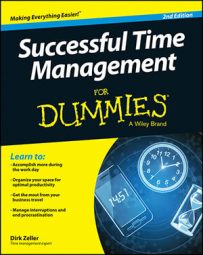Recent advances in electronics and technology have given consumers a bevy of new tools. From hardware to software, the choices are nearly endless for ways to track your time and keep yourself on schedule. Evernote, Dropbox, ScanSnap, Google Calendar, Excel, and LastPass represent software and applications; and of course, tablets and smartphones are needed to run these programs.
The leverage you create through using current technology adds value to your life, and can also make you more in demand — you can access data and documents within seconds, have a face-to-face talk with a client across the country without leaving your office, and you can stay on top of your schedule every day.
Making choices about technology
Being successful enables you to make more choices. The person who earns a million dollars a year has more choices and freedom than someone who makes one-hundred thousand a year. The goal should be a life filled with choices and freedom, such as the choice to take the afternoon off on a beautiful day.
In the world of technology you have to make choices. Do you go with a smartphone, tablet, phablet (combination phone and tablet), a desktop computer, a laptop computer, or a combination of several devices? You also need to decide on operating system platforms. Are you on the Apple team with your iPhone, iPod, Macbook, and desktop? Or are you running a PC with Microsoft products and an Android phone system and tablet?
Unlike ten years ago, you can actually choose to use both Apple and PC systems. Switching back and forth, however, can create confusion, crossover, duplication, and potentially lower productivity . . . and yes, using two systems can take up more time. Find a combination of hardware and possibly software that works for you. Knowing your systems and making wise choices can lead to huge time savings for you.
Automate rather than replicate
A large waste of time is created when you do the same tasks over again and again each day, week, or month. Automotive companies have transitioned many of the repetitive car-building tasks to machines over the last 20 to 30 years. Their efficiency rate has grown per each car they build.
There are a number of simple ways to automate your workday. Setting up an online banking system is one. The truth is, the amount of time it takes to pay your bills via check can be slow and cumbersome. Setting up your recurring payments — such as your mortgage, life insurance, health insurance, electric bill, cable bill, garbage service, city services, credit cards, and so on — on an automated process is easy.
You certainly need to review the bills each month to ensure you have the funds necessary to pay them, but you schedule a date for the bills to be paid and voila . . . bills are automatically paid and you’ve saved time.
You can also set up a specific amount to transfer to your savings or investment accounts each month. The process of forced savings creates more freedom and time for you later in life. The vast majority of people don’t retire well off. It’s not because they failed to make enough money; they’ve simply failed to save any of it. The world is filled with stories of lower-income people who gave large sums of money away at their death. The reason wasn’t because of their vast earned income. It was due to them having a savings system. Any online banking system allows you to be more structured in your savings.
In evaluating what you can automate, ask yourself these questions:
What do I do each day that I can automate and save time?
What do I do each week that is routine and can be automated?
What unpleasant tasks do I do that can be automated?
Look around and see if there’s a software program or small application that can make your life easier by doing tasks for you, or simply remind you that a task needs to be accomplished.

